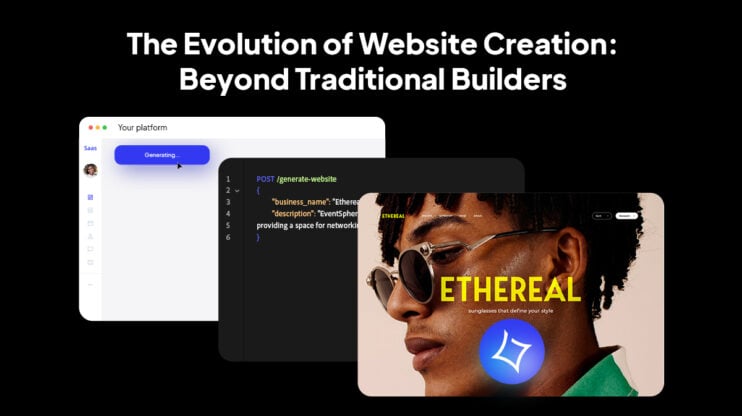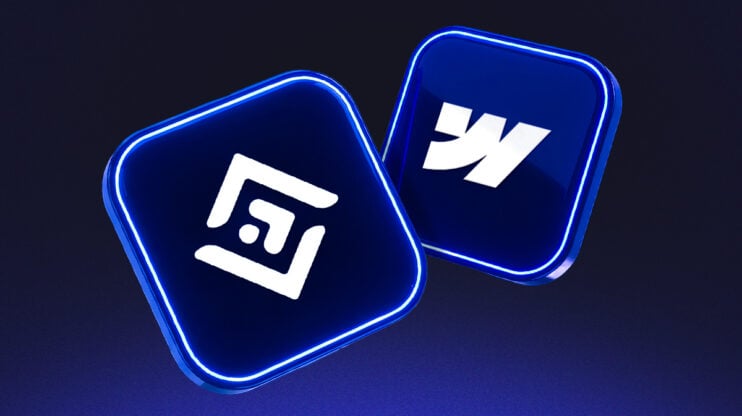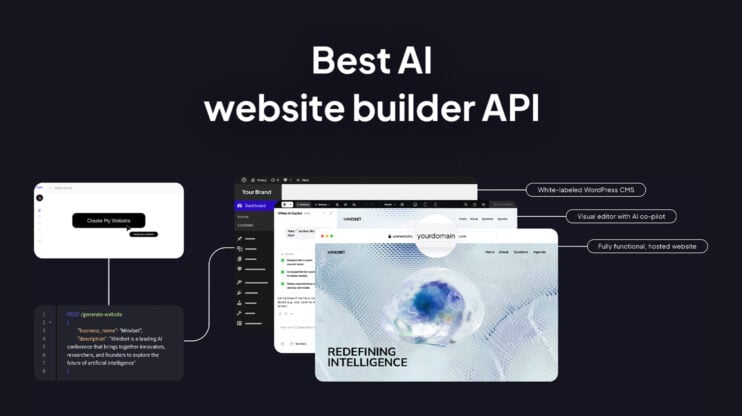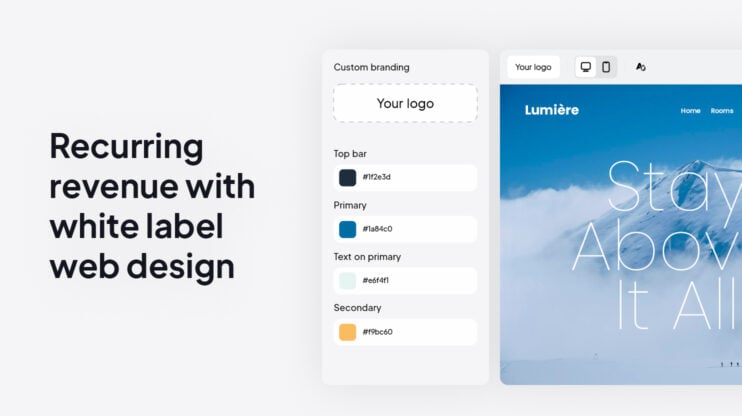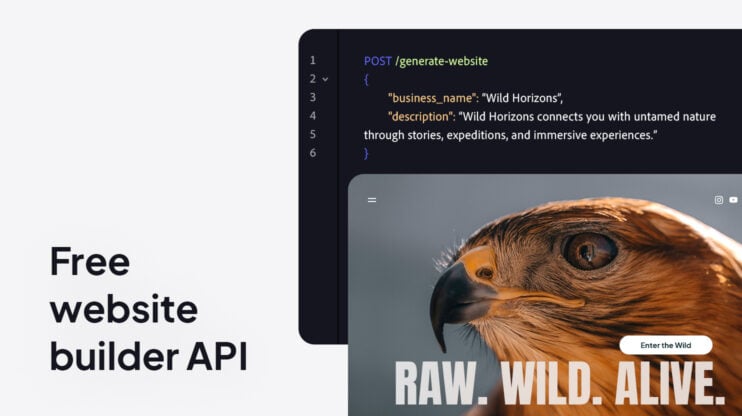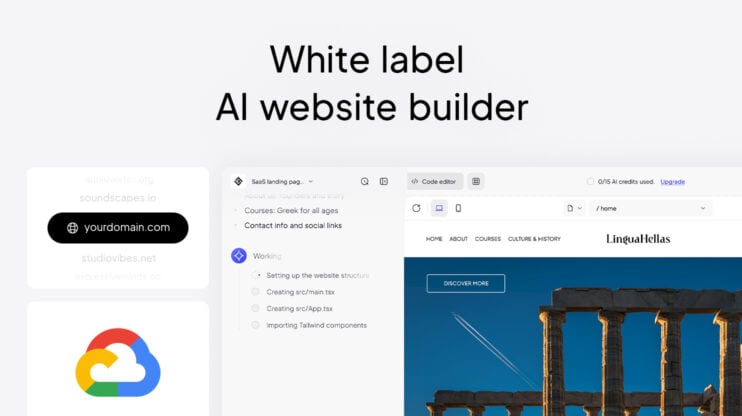If you’ve spent any time running an agency, building SaaS, or selling hosting, you’ve probably had this thought: “ Do we really have to build a website builder from scratch?”
The short answer is no. That’s exactly what white label website builder APIs are for. They let you plug a powerful site builder into your product, wrap it in your own branding, and sell it as if it’s yours, without reinventing the editor, hosting, or infrastructure.
In this guide, we’ll unpack what a white label website builder API actually is, why it’s suddenly everywhere, and then walk through seven of the strongest platforms agencies, SaaS teams, and hosting providers are using today.
What is a white label website builder API?
At a human level, a white label website builder is a website platform you can rebrand and resell as your own. Your customers see your logo, your colors, your domain, and your pricing. The original provider stays behind the curtain.
When you add an API to that, you get a white label website builder API: a site builder you can embed inside your own product and control programmatically. You can automatically:
- create a new website whenever someone signs up
- pre-fill it with content and branding
- send users into a familiar, no-code editor that still lives under your brand
Technically speaking, you’re integrating a multi-tenant website builder SaaS through APIs and embeddable components, so you can provision, manage, and customize sites from your own app.
How it’s different from other website builders
Popular DIY builders are designed for end users. You send your customer to their site, they create an account there, and that platform owns the whole experience.
With a white label website builder:
- the editor can be embedded as part of your product
- the dashboard lives on your domain
- your customers may never know the underlying platform’s name
- you control plans, pricing, and support
In other words, the builder becomes a feature of your own solution—whether that’s an agency client portal, a CRM, a marketing suite, or a hosting control panel.
Why white label website builder APIs are taking off
Agencies and freelancers are under pressure from both sides: DIY tools on one end and enterprise platforms on the other. Agencies want scalable, branded website services. What they need is leverage, ways to ship more sites, faster, without turning everything into a custom build.
A white label website builder API lets an agency:
- launch templated, repeatable offers (“Launch in 5 days”, “One-pager in 24 hours”)
- keep everything fully branded, including a client website builder portal
- turn websites into a stable recurring revenue stream with hosting and care plans
Instead of building every site from scratch, they can lean on a no-code white label builder and focus their energy on positioning, copy, funnels, and upsells.
SaaS products want instant website as a native feature
On the SaaS side, the pattern is similar. CRMs, booking tools, and vertical SaaS platforms all feel pressure to help their customers “look professional online” as fast as possible.
Embedding a website builder API solves that. Teams can:
- add a “Create your website” step straight into onboarding
- generate basic sites from user data (business name, industry, services)
- keep users inside their own product instead of handing them off to a third party
Platforms like 10Web and Duda explicitly position their partners this way—giving them the ability to embed websites into their core offering and sync content from their platform into the site.
How white label website builder APIs work
In practice, most embedded website builders follow a similar pattern:
- You integrate an API to create and manage sites from your own backend. For example, when a new customer signs up, your system calls the website builder API to create a new site or workspace. Platforms like 10Web and Duda expose partner APIs specifically for this.
- You embed the editor inside your app using an iframe, JavaScript SDK, or a dedicated component. To your users, it feels like just another screen in your dashboard.
- You handle login and routing so users can jump into “Edit my site” without juggling multiple accounts.
Behind the scenes, you’re still using a multi-tenant website builder SaaS. But from your customer’s perspective, they’re just using your product—and it happens to come with a surprisingly good website builder built in.

Your Brand. Their Website. Done.
Launch websites fast, with ongoing revenue built in. 10Web’s white-label AI Website Builder lets your agency scale without extra dev time.
The 7 best white label website builder APIs for agencies & SaaS
Let’s look at seven platforms that come up again and again when people talk about white label website builder APIs. They’re not identical, each leans toward specific audiences and strengths, but together they map the landscape pretty well.
1. 10Web: AI-powered WordPress builder under your brand
If you like the idea of WordPress but hate the overhead of managing it at scale, 10Web is one of the more interesting options on the market. It is positioned less as another white label builder and more as an OEM web layer (Original Equipment Manager) you plug into your product. Core pieces you get under your own brand:
- AI Website Builder for WordPress – generates full sites (structure + content) from a brief or dataset
- Managed WordPress hosting & performance stack – optimization, backups, security handled for you
- Website Builder API – programmatic site creation and management from your own app or flows
- White Label Reseller Dashboard – your logo, your domain, your plans, your pricing
For agencies, this means you can resell AI-generated WordPress sites under your own brand, define custom plans, and manage billing and MRR from a single dashboard. For SaaS teams, the API and integration options make it possible to embed AI-generated sites directly into your product experience.
10Web is especially strong if:
- you want the flexibility and plugin ecosystem of WordPress
- you care about Core Web Vitals–level performance and automated optimization
- you want “AI + white label + hosting” in a single stack rather than stitching multiple vendors together
Strategically, 10Web leans on business metrics more than vanity features. The focus is on:
- Time-to-first-site – get something live fast with AI
- Time-to-change – update many sites quickly when offers or policies change
- Time-to-first-attach – turn that first site into recurring revenue (hosting, SEO, analytics, payments)
Because everything is still WordPress, partners keep flexibility and portability rather than locking customers into a closed box. In practice, you treat 10Web as a composable, AI-powered WordPress layer: your brand in front, your bundles and pricing on top, 10Web running the rails underneath.

Request your API demo now
See how easy it is to integrate AI website generation into your platform!
2. Duda: A mature white label platform for agencies and hosters
Duda has been a go-to name in the agency world for years, largely because it was designed from the start as a white label website builder for pros, not just a consumer tool. Their pitch is simple: make the whole platform your own.
Duda offers:
- a polished, no-code editor with strong responsive design tools
- built-in support for local business features and eCommerce
- white label capabilities for rebranding the dashboard and client-facing areas
- a Partner API that lets you automate site creation, publishing, and analytics, and integrate websites into your existing product.
It’s a natural fit for:
- agencies that want a stable, battle-tested platform with white label baked in
- hosting providers who want to offer a quality site builder to their customers
- SaaS tools that need a visual editor but don’t want to maintain it themselves
Duda is less about bleeding-edge AI and more about robustness, workflows, and partner-friendly infrastructure, which many established agencies appreciate.
3. Webflow: Design-first, with extensible APIs
Webflow doesn’t scream “white label” in the same way as others, but it earned a place in this list because of its design power and enterprise integrations. For teams that care deeply about visual fidelity and custom layouts, Webflow is often the default choice.
On the API side, Webflow gives you:
- APIs for CMS content, eCommerce, and site exports
- the ability to integrate your own workflows or automate parts of the build process
For white label use, Webflow tends to show up in more curated setups: agencies building under their own accounts and giving clients a branded portal, or SaaS platforms that use Webflow as an internal engine for marketing sites and some customer-facing pages.
If you’re building a product where pixel-perfect design is the differentiator, Webflow is worth shortlisting—even if you’ll need to be a bit more creative about full white labeling than with something like 10Web or Duda.
4. Brizy: White label AI website builder for agencies, hosts & SaaS
Brizy is a white label website builder focused on AI + drag-and-drop editing, with a big emphasis on agencies, resellers, and SaaS. You resell Brizy Cloud or run it on-premise, while your clients see only your brand and domain.
Core idea: Brizy gives you a ready-made builder SaaS that you can wrap in your own branding and pricing, instead of building one from scratch.
Notable strengths
- AI website builder – Brizy’s AI can spin up layouts and content in seconds, letting your users start from a near-finished design rather than a blank page.
- 100% white label branding – use your own logo, name, and domain, and rebrand the interface, emails, and customer communication as your own.
- Multi-platform – Brizy isn’t just Cloud; it also powers a WordPress website editor and other integrations, so you can keep using WordPress where it makes sense.
- Reseller focus – dedicated programs and marketing materials for hosts, agencies, and SaaS partners who want to offer “websites under our brand” without building the tooling.
Brizy is a good fit if you want to launch a branded website builder quickly, lean on AI for speed, and don’t need deep custom back-end logic—your main job is packaging the service, not engineering the editor.
5. Simvoly: All-in-one white label platform
Simvoly goes beyond just “website builder” and positions itself as a white label all-in-one business platform: websites, funnels, communities, e-commerce, CRM, email marketing, automations, and appointments in one stack.
You can run a fully white label under your own domain, logo, and UI, and let customers self-serve: register, pick a template, customize, and subscribe—without you needing to intervene.
Notable strengths
- True all-in-one – websites, funnels, communities, stores, CRM, email campaigns, messaging, automations, and bookings in one solution, aimed at conversion-oriented use cases.
- White label SaaS builder – customize branding, domain, templates, and pricing plans to effectively run your own DIY platform.
- REST API & integrations – Simvoly exposes an API for managing contacts, products, orders, and more, and plugs into automation tools like Pipedream, Make, and other iPaaS platforms.
- Scalable hosting included – AWS-based hosting, global CDN, and free SSL are bundled in, so you’re not juggling separate infrastructure contracts.
- Partner-friendly features – central customer management, custom templates, built-in affiliate functionality, and a non-branded academy you can reuse for training under your own brand.
Simvoly makes the most sense if you want to offer more than just a site builder under your brand, with APIs and automations to wire it into the rest of your stack.
6. Site.pro: Hosting-friendly white label builder
If you’re a hosting provider, domain registrar, or telco, Site.pro is almost tailor-made for you. Their messaging is very direct: a 100% white label website builder where you can add your own domain, logo, and branding, and resell it as part of your hosting services.
Key traits:
- works with many popular control panels and hosting environments
- lets you brand the builder as your own, including removing the original logo
- supports reselling via either subscription or revenue share models, so you can choose whether you want fixed margins or shared upside.
Site.pro feels particularly strong if you already run infrastructure and want to enrich your hosting plans with a reseller website builder solution that doesn’t fight your existing tech stack.
7. Weblium: Agency-oriented white label website builder
Weblium positions its White Label Website Builder for agencies very clearly: it lets you build and resell websites under your own brand while running everything on Weblium’s engine.
What makes it appealing to agencies:
- a straightforward, block-based builder that non-technical clients can use
- the ability to create a White Label Agency account and remove Weblium branding from client-facing areas
- a workflow that fits “build sites for clients quickly, then hand off light editing if needed”
If you don’t need deep custom coding but want a no-drama, no-code white label builder you can layer your own strategy and services on top of, Weblium is a sensible, focused option.
Real-world use cases: How teams use APIs
When teams talk about using a website builder API, they’re wiring it straight into how they sell and deliver websites. In the real world, that looks like productized packages, SaaS tools hiding behind one button, and hosts baking site creation directly into their control panels. Below are a few real world examples.
Agencies productizing website packages
A lot of agencies quietly run on a simple formula: pick a solid white label website builder, craft a handful of high-converting templates, and then sell them as productized offers.
For example, an agency might:
- use 10Web or Duda to build a stable of niche-specific designs
- onboard clients through a branded portal
- offer tiers like “DIY with support,” “Done with you,” and “Done for you”
Under the hood, each site lives in the agency’s account on a white label website builder. Clients see only a clean, branded interface and a predictable experience. For the agency, this combination of agency website builder tools and a structured process makes scaling much more realistic.
SaaS products adding built-in websites
On the SaaS side, the pattern looks more like this:
A CRM or booking app wants to help users “go live online” but doesn’t want to become a website company. So they integrate a website builder API, wire up some data mapping, and offer a “Create your website now” button in their onboarding.
Behind that button, an API call:
- creates a site using a predefined template
- injects account data like business name, location, and basic services
- returns a URL that the user can edit from within the SaaS UI
Platforms like Duda and 10Web explicitly support this “add websites to your core offering” model via partner APIs and integration docs.
For these teams, the embedded website builder isn’t even the headline, it’s one more feature that keeps users from churning to other tools.

Request your API demo now
See how easy it is to integrate AI website generation into your platform!
Hosting providers and registrars bundling a builder
Hosting providers and domain registrars have a different pain point: customers buy a domain and get stuck. A white label website builder helps them bridge that gap.
Tools like Site.pro and uKit’s white label partnerships show up here a lot. Hosters can:
- add a “Website Builder” button inside their control panel
- bundle DIY websites in their hosting plans
- keep the interface fully branded as their own
Done right, this turns “domain + hosting” into a more complete small-business solution, and reduces the risk that customers wander off to other platforms as soon as they’re ready to build a site.
Choosing the right platform for you
You don’t need to pour years of engineering to build your own website builder. Is building a website builder is actually your edge or can that part be handled while you focus on customers, positioning, and growth.
A solid white label website builder API lets you embed a polished, evolving editor, connect it to your own pricing and UX, and treat websites as a new revenue line, not a new engineering org. You’re essentially renting years of someone else’s R&D, AI, hosting, templates, performance—and wrapping it in your brand.
How you approach it can stay simple and intentional:
- Clarify where you add value. Strategy, support, niche features, distribution—usually not reinventing the editor.
- Map your use case: agency, SaaS product, hosting/registrar, or a hybrid.
- Shortlist 2–3 builders that fit that use case—10Web, Duda, Weblium, Site.pro, uKit, etc.
- Run a small pilot with one real client and one real workflow, and ask: does this feel like it belongs inside our product?
In this case, scaling stops being about building a website builder from scratch and becomes about refining your templates, tightening your process, and pricing your white label website builder so it supports the kind of business you actually want to run.
FAQ
What is a white label website builder API?
A white label website builder API is a programmable interface to a site-building platform that you can rebrand as your own. It lets your product (SaaS, hosting panel, agency portal, etc.) automatically create and manage websites under your logo, domain, and pricing, while the provider runs the underlying builder, hosting, and updates.
Who should use a white label website builder: agencies, hosts, or SaaS?
All three.
- Agencies use white label builders to sell websites and care plans under their own brand
- Hosting providers and telcos bundle them into domain/hosting packages
- SaaS products embed them as a “create your website” feature inside onboarding.
In each case, the API and white label branding let you add websites without building a platform from scratch.
How is a white label AI website builder different from a normal AI builder?
A normal AI builder (like a consumer tool) sells directly to end users under its own brand. A white label AI website builder—like 10Web’s AI WordPress builder—lets you wrap the AI flow in your branding, connect it to your billing, and plug it into your existing product via API, plugin, or reseller dashboard. Your customers get AI-generated sites under your brand; you keep the relationship and recurring revenue.
What’s the difference between a white label solution and just using an API?
An API gives you technical access to a service (create sites, sync data, etc.) but the provider’s brand may still be visible, or you may have to build the UI yourself. A white label solution includes branding controls, ready-made UI, and partner tooling so the service looks and feels like your own product. The best white label website builders combine both: API + full white-label UI, so you get deep integration and your own front-end experience.
How do I choose between 10Web, Extendify, Duda, Site.pro, Brizy, BaseKit, and Simvoly?
Start from your distribution model:
- Agencies / MSPs: prioritize strong white label branding, templates, and client management (10Web, Duda, Brizy, Simvoly).
- Hosts / telcos / registrars: look for tight control-panel integration and multi-tenant management (Site.pro, BaseKit, 10Web, Extendify).
- SaaS products: you’ll care most about APIs, SDKs, and embeddable builders (10Web Website Builder API, Duda Partner API, Simvoly REST API).
Then shortlist 2–3 platforms, run a small pilot with real users, and measure not just time-to-first-site, but how quickly you can attach recurring add-ons like hosting, SEO, or analytics.







